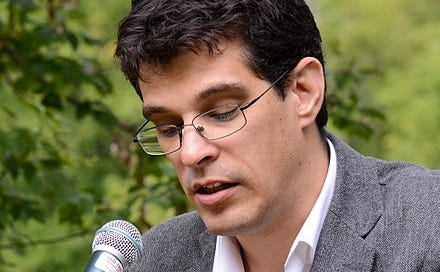Dear readers,
Due to some recent events in the Canadian literary scene, I set aside the essay I was working on for this week. While I originally did not intend to use this platform to comment on timely events, I felt morally obligated to break the rigid format I set for myself in order to address a controversy I should have spoken up about long ago. In retrospect, I should not have limited myself to only posting on Sundays, and to research-heavy analyses. I am abandoning this rigidity to give myself more freedom moving forward.
If you are a member of the Canadian literature scene and upset about what I’ve written below, I ask that you read the first article I posted on this Substack, “Particles and Waves: On Changing Your Mind”, before sending me a message about it.
Thank you for reading. The article is below the dividing line.
Meghan Bell
On January 10, 2024, the B.C. Court of Appeal ruled that Steven Galloway, the former head of UBC creative writing and best-selling author of The Cellist of Sarajevo and three other novels, can sue the anonymous woman (known as A.B.) who accused him of rape, as well as a number of others he alleges publicly repeated her claims. A.B. and Galloway had an affair from 2011-2013 while she was a graduate student, which he claims was consensual and she claims was coerced. A.B. was a mature student, five years Galloway’s senior, and had previously worked as a professor herself in a different creative field. Both were married at the time.
Galloway was put on leave in late 2015, and fired after an internal investigation in 2016, despite the judge finding that on a balance of probabilities no assault occurred. In late 2016, dozens of writers signed an open letter out of concern for what they believed was a violation of due process in UBC’s handling of the case. After the backlash, many writers removed their names from the letter, while others were added to it.
The fallout was catastrophic for “CanLit”; friendships and mentorships fell apart, and many of the signatories of the open letter were harassed and blacklisted. At UBC, staff members who supported Galloway were silenced, and eventually forced out of their jobs in one way or another. Galloway was harassed and vilified online, and lost nearly all of his friends, his job, his reputation, and his career as a writer. Since being fired, he has supported his family—he and his new wife, also a graduate of UBC creative writing, have four kids between them—with odd-jobs in manual labour, writing ad copy, and sales.
Female signatories were disproportionately targeted for harassment, even though many were survivors of sexual assault themselves. Probably the most appalling example of this is the abuse directed toward Carmen Aguirre, a memoirist and playwright who was famously raped at knifepoint while a teenager, and who became a primary target for many of those who opposed the open letter.
I was an MFA student at UBC when these events unfolded, and an active member of the Vancouver literary scene due to my involvement at a local literary journal. When the open letter was published, I was one of many who spoke out against it on social media. While I am still conflicted about the open letter and its effects on the literary community I cared so deeply about, I am no longer confident I was right to do so, and I now think I was in the wrong when I tried to pressure some of the signatories, including the ever-stubborn Margaret Atwood, to remove their names. (To my credit, I also publicly opposed and resisted the blacklisting of signatories, and was harassed by a handful of Twitter activists for this; I also continued to correspond and work with signatories, in particular Susan Swan, who became a close friend and mentor, much to the ire of certain activist-writers who opposed the open letter. On the other hand, exactly zero of the signatories of the open letter mistreated me even as I openly criticized them.)

I want to address the main argument put forward by A.B.’s defense team; that the defamation lawsuit against her and the defendants who publicly repeated her claims will discourage women from reporting sexual harassment, assault, and rape.
A similar argument was raised in the Amber Heard - Johnny Depp trial. After the verdict favoured Depp, Heard wrote, “It’s a setback. It sets back the clock to a time when a woman who spoke up and spoke out could be publicly humiliated. It sets back the idea that violence against women is to be taken seriously.”
In other words, if one woman is found to have lied or exaggerated about sexual violence, this somehow reflects on and will affect all women. The not-so-subtle subtext here is support me or no one will believe you either. We’re all in this together, ladies.
Except we aren’t. Women are not monolithic, and the vast majority of people understand this. Steven Galloway did not accuse “all” women of lying about sexual assault, and he has never publicly implied that the majority of sex-crime allegations are false. He has accused exactly one woman of lying, and several others of repeating her allegations (while presumably believing them to be true). In a statement, he said he “sincerely hope[s] no one who has experienced sexual assault views this case as a barrier to reporting.”
Sexual harassment and assault cases are notoriously difficult to prove; there is often no evidence beyond the victim’s testimony. In the absence of any evidence, I default to believing any woman who claims she has been assaulted or abused, because I still believe that the majority do not lie about such things.
However, lies are often hard to maintain. Liars, especially compulsive ones, tend to make mistakes. Take, for example, the case of major league baseball pitcher Trevor Bauer; after he was accused of violent rape by a woman he had slept with, evidence emerged that the woman, Lindsey Hill, had texted her friends about taking advantage of Bauer for financial gain prior to their tryst, and had taken a video of herself the morning after the alleged assault, smirking at the camera, clearly uninjured.
Once there is evidence that a woman’s story may not be credible, it is prudent to become more skeptical of her claims. This is the case in the Galloway scandal.
False allegations are over-represented in sexual harassment and assault reports made to the police and other authorities. This is because the vast majority of women do not report or make public their experiences of sexual assault or harassment, and so only a fraction of true cases are reported, whereas, by definition, 100% of false allegations are reported or otherwise made public. This is especially true when rich and powerful men are accused, and a financial or careerist motive may exist.
While I confess I still default to “believe women”, I also recognize that false allegations are likely more common than I realized. In a striking article for Psychology Today, Dr. Chloe Carmichael, a clinical psychologist, reports working with women “who openly discussed thoughts of making false allegations as a strategy for revenge, advancement, or both”, as well as women who “acknowledged having made false allegations in college or other situations earlier in life.”
The majority of people telling rape victims in the public forum that no one will believe them are women who have been credibly accused of lying and the activists who support them. Where is the public outcry about these women essentially using rape victims as shields to deflect responsibility for their behaviour?
If these cases really do terrify women into not reporting, the burden of blame should fall on the people like Amber Heard and A.B.’s lawyers for telling women that the outcomes of their cases mean that no one will believe them either, and on the members of the media who uncritically repeat this argument. It should not fall on the men who credibly defend themselves, which they have the right to do.
Steven Galloway’s mistakes are significant: he cheated on his wife, conducted an affair with a student, and the ancillary reports against him suggest he is also guilty of immaturity, of failing to recognize the impact of his fame on star-struck aspiring writers, of a proclivity for alcohol, and of an unhealthy desire to be liked. I think most people familiar with the case would agree with this assessment, including Galloway himself.
For what it’s worth, I don’t know many writers to whom at least one of these criticisms doesn’t apply—myself included. One of the most devastating aspects of this case is that the majority of people on both sides clearly believed they were doing the right thing; this includes many of the people who were sued for defamation alongside A.B.. In particular, I am heartbroken about Annabel Lyon, one of two UBC professors being sued by Galloway, who, from my interactions with her, always struck me as a genuinely caring person—albeit one who severely screwed up. Once a close friend of Steven Galloway’s, during the events in question she was clearly sleep-deprived, stressed-out, and over-worked, and I doubt she would have been able to think clearly under such duress. If A.B. did indeed lie about Galloway assaulting her, I consider most of her supporters to also be victims of her deceit and manipulations.
While I believe—as nearly all those close to the case do—that UBC grossly mishandled the situation, I don’t have a problem with the fact that he was fired as the head of the creative writing department. However, there is a big difference between being an alleged jerk and an alleged violent rapist. The loss of his reputation, friends, and writing career are unwarranted punishment for the former.
And now he will have the opportunity to prove that he is not the latter.
For this, I wish him the best of luck.
For those readers who are unfamiliar with this controversy and wish to learn more, I recommend checking out the Substack “Truth & Consequences” by former City of Vancouver poet laureate Brad Cran.




I don't quite know how to describe the atmosphere at UBC to justify the "don't have a problem with Steven Galloway being fired" comment (maybe someone else who was there could do it justice but I can't right now), but someone emailed me to point out that if being an alleged jerk is a fireable offence, then pretty much all of us would be screwed, and I think that's an excellent point.
Are you aware that Depp was found guilty of the 12 of the 14 assault charges brought against him in the UK? The UK is much more educated about the nature of coercive control and the abuse that is a reality for many. This is, in fact, the opposite of what happened with Galloway.
Conflating the two of them is both a disservice to Galloway, who deserves a chance to be heard, and to Heard, whose crime was being naive enough that she thought money and misogyny could be beat with truth in the UK. I suggest amending this article because blending the two of them creates a lot of unintended harm. Depp was spiteful and vindictive throughout his trial. I do not think Galloway will be the same.